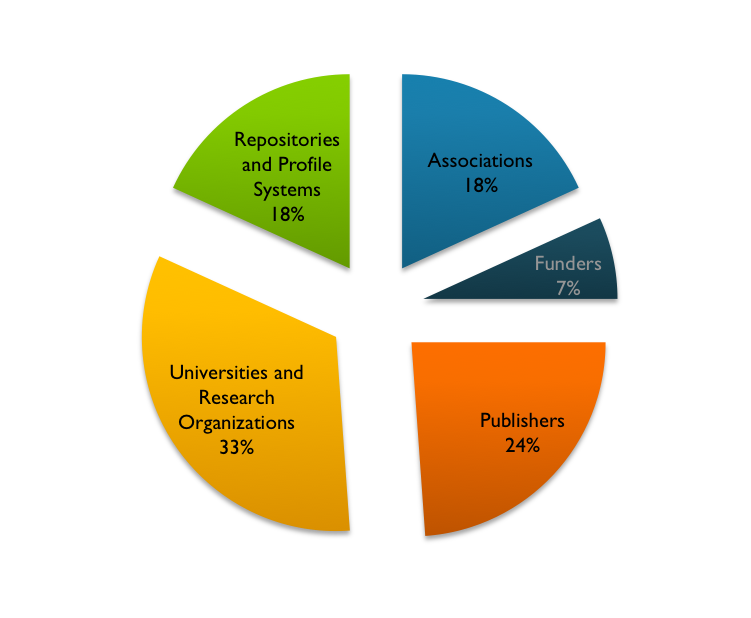We held our Fall 2013 ORCID Outreach Meeting (#orcid11) on 30 October in Washington, D.C. at the headquarters of the American Geophysical Union. The meeting was attended by 115 stakeholders from publishing, funding organizations, professional societies, and universities and research institutes. Slides, photos, and a recording of the event are available online.
ORCID Registry Progress and Plans

The ORCID team provided an overview of progress in the first year after the launch of the ORCID Registry and a preview of the coming developments. We have registered more than 350,000 researchers. Ninety organizations have joined as ORCID members, with strong representation in all sectors of the scholarly communications community (see the pie chart). Over 50 organizations have already integrated ORCID identifiers into workflows, including five import wizards (CrossRef, ANDS, Europe PubMed Central, ResearcherID, and Scopus) that make it easy for researchers to link their ORCID record to their research works. You can check out the current ORCID integrations on our integrators web page. ORCID also has released its first annual public data file under a CC0 waiver.
To connect with researchers globally, ORCID makes the Registry interface available in English, Spanish, French, Simplified Chinese, and Traditional Chinese, and we plan to publish the interface in more languages in 2014. We will soon launch an affiliations feature, enabling users to associate past and current educational and employment affiliations with their ORCID profile. And, a feature to support linkages with grants will be available by early 2014.
We have been engaging researchers at booths and presentations at a variety of professional society meetings; look for us at Society for Neuroscience, American Geophysical Union, and Modern Language Assocation meetings in the next three months. In addition, a diverse cadre of 51 ambassadors from 22 countries is helping to support the global ORCID outreach effort. In 2014, we aim to triple the number of registry users, support national-level memberships, and add third-party assertions functionality, account delegation features, and integration with ISNI.
Integration of ORCID Identifiers
A panel discussion with speakers from the funding, professional society, university, and publishing communities highlighted the ways that organizations are integrating ORCID identifiers in workflows and systems.
Veronique Kiermer from Nature Publishing Group provided an overview of NPG’s integration of ORCID identifiers in their manuscript submission and production workflows. The benefits of ORCID identifiers to publishers are considerable: disambiguation of user accounts, cross-talk between multiple internal systems, and improved service to authors. NPG, an ORCID member, currently requests authors link to their ORCID iD during manuscript submission, displays author ORCID iD in the html version of the published article, and includes ORCID iDs in submissions to CrossRef and PubMed. ORCID is working with publishers and CrossRef to enable updates of ORCID records with new publication information, saving time and improving convenience for researchers. For more on publishing workflows, see the videos and slides from our September 2013 Implementation Workshop for Publishers.
Christine McEntee of the American Geophysical Union spoke about the promise of ORCID identifiers for professional societies. She described how ORCID iDs have the potential to support a “360 view” of their members as authors, reviewers, members, and meeting participants. ORCID iDs can be used to disambiguate records and in so doing, improve the society’s ability to find qualified experts for scholarly review, manage conflicts of interest, facilitate research collaborations, track career outcomes, and identify qualified candidates for committee service. AGU is an ORCID member and is in the process of integrating ORCID iDs with their publishing and membership management databases.
Amy Northcutt of the U.S. National Science Foundation spoke about how ORCID identifiers can be integrated into funding workflows, with many positive results, including reduced administrative burden for researchers; increased ability to identify reviewers and identify conflicts of interest; improved longitudinal analysis and evaluation capabilities; and improved collaboration and knowledge sharing across units, disciplines, agencies, and nations. She also provided an overview of the integration of ORCID identifiers into ScieNCV, a new electronic system enabling researchers to easily assemble biosketch information in order to simplify the grant application process. The product of an inter-agency partnership, SciENcv is now in use by the U.S. National Institutes of Health and NSF will begin using in 2014.
John Vaughn of the Association of American Universities described how a persistent, unique identifier can support the mission of research universities: reducing the administrative burden on faculty and staff by auto-populating grant biosketches and other required reporting forms; facilitating improved campus research management; supporting more effective outcomes tracking; and enabling the connections to support interdisciplinary collaboration. ORCID will improve convenience for researchers, enabling them to spend less time repeatedly entering the same data, allowing more time for research activities. He mentioned the impact of the Sloan-funded ORCID Adoption and Integration program on catalyzing the use of ORCID identifiers by universities in a variety of systems.
Discussing Workflows
In the afternoon, we hosted working sessions with publishers, societies, and funders to discuss and develop best practices for integration of ORCID identifiers into research workflows. The Outreach meeting opened with updates on ORCID registrations and memberships, integrations, and technical plans and provided opportunities to interact with ORCID staff. Working session participants discussed a draft workflow document, explored opportunities for embedding ORCID identifiers, and identified gaps and next steps for the research community. We will be documenting these conversations and developing recommendations for best practices.
Save the date!
Please save the date for our next ORCID Outreach Meeting, which will be held in Chicago, Illinois, USA on May 21, 2014. The program will highlight the prototypes of the Sloan-funded Adoption and Integration projects within universities, research organizations, and professional societies.
